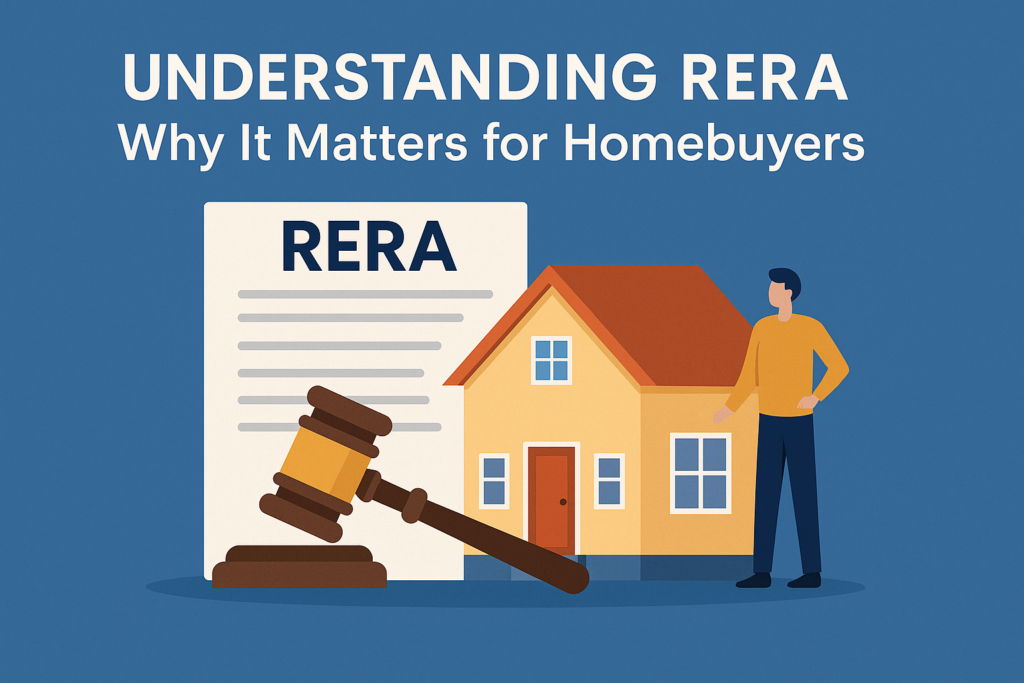
Buying a home is one of the most significant investments in a person’s life. However, for many years, homebuyers in India faced challenges like project delays, lack of transparency, and unfulfilled promises. To protect homebuyers and bring accountability to the real estate sector, the Government of India introduced RERA (Real Estate Regulatory Authority) through the Real Estate (Regulation and Development) Act, 2016.
In this blog, we’ll break down what RERA is, how it empowers homebuyers, and why it plays a critical role in real estate transactions today.
📘 What is RERA?
RERA stands for the Real Estate (Regulation and Development) Act, which came into effect on May 1, 2017. Its primary objective is to regulate the real estate industry, ensure transparency, and protect the interests of homebuyers while promoting fair practices among builders and developers.
Each state and union territory in India has its own RERA authority, and all residential and commercial projects above a certain size must register under it.
🔍 Key Objectives of RERA
Protect homebuyer interests
Ensure transparency in project details
Prevent project delays
Establish a fast-track dispute resolution system
Create accountability for developers and promoters
🛡️ Why RERA Matters for Homebuyers
1. ✅ Mandatory Registration for Projects
Under RERA, developers must register their projects before marketing or selling. This includes submitting all necessary project details such as layout plans, approvals, timelines, and legal titles. Homebuyers can verify these details on the respective state RERA websites.
Why it matters: It ensures you are investing in a verified and approved project.
2. ⏳ Timely Project Completion
One of the biggest concerns in real estate has been project delays. RERA holds builders accountable to deliver on time. If delays occur, the developer must compensate the buyer.
Why it matters: Homebuyers are no longer at the mercy of builders for possession.
3. 💰 Advance Payment Cap
Builders cannot demand more than 10% of the property cost as an advance before signing a formal agreement.
Why it matters: It protects buyers from financial exploitation and gives them time to make informed decisions.
4. 📜 Transparent Documentation
Developers must provide accurate project plans, legal approvals, carpet area (not super built-up), amenities, and possession timelines.
Why it matters: Reduces misinformation and ensures what you see is what you get.
5. 🔧 Five-Year Defect Liability
Post-possession, if there’s any structural or workmanship defect within 5 years, the developer must fix it free of cost.
Why it matters: Offers peace of mind and ensures quality construction.
6. ⚖️ Grievance Redressal
RERA has set up fast-track adjudicating bodies to address complaints by buyers within 60 days.
Why it matters: Buyers can seek justice without long legal battles.
7. 💼 Accountability of Promoters
Promoters must deposit 70% of the project funds into a separate bank account and use it only for construction and land costs. This prevents fund diversion.
Why it matters: Ensures that the money you pay is being used for your home, not elsewhere.
📊 Impact of RERA So Far
Since its implementation, RERA has:
Reduced the number of fake and unregistered builders.
Empowered consumers with legal knowledge and recourse.
Improved confidence in real estate as a trustworthy investment.
Boosted organized and compliant developers.
🏁 Final Thoughts: RERA as a Game Changer
For years, the Indian real estate sector was plagued by trust issues. RERA has changed the game by putting the homebuyer at the center of all decisions. Whether you’re buying your first flat or investing in a villa, checking the RERA status of a project is now non-negotiable.
Before making any property purchase, ensure that:
The project is RERA registered.
You verify details on the state’s RERA portal.
You understand your rights and remedies under the Act.
With RERA in place, your homebuying journey is safer, more transparent, and fair.
📌 FAQs About RERA
Q1: Is RERA applicable to all states in India?
Yes, but implementation varies by state. Each state has its own RERA portal.
Q2: Can I file a complaint against a builder under RERA?
Absolutely. You can lodge a complaint online on your state’s RERA website.
Q3: What if a project is not RERA registered?
It’s advisable not to invest in projects that aren’t RERA compliant, as they offer no legal protection under the Act.
🧭 CTA:
Planning to buy a new home? Check the project’s RERA registration first.
Visit your state’s RERA website and invest with confidence.
